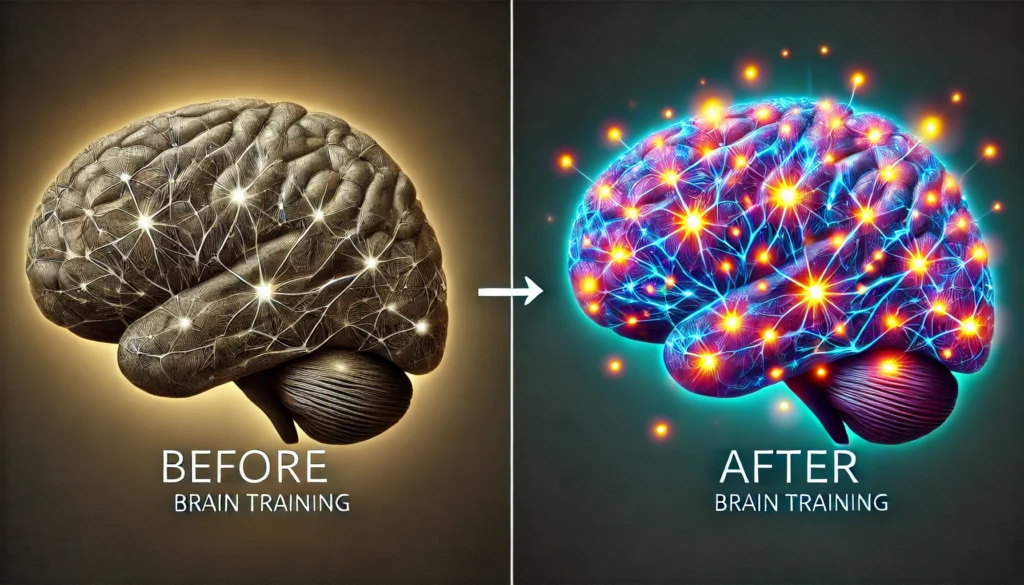Over the past few decades, the popularity of brain fitness games has surged. From digital platforms like Lumosity and BrainHQ to traditional puzzles and board games, these activities claim to boost cognitive functions such as memory, attention, and problem-solving skills. The appeal is undeniable—who wouldn’t want to improve their mental faculties with a few minutes of daily play?
You may also like: Boost Your Mind: Top Brain Games
Historical Context of Brain Training
Historically, the idea of exercising the brain is not new. Ancient scholars engaged in activities like chess and mathematical puzzles to stimulate their minds. These activities were seen as essential for intellectual development and were often part of educational curriculums for the elite. Such exercises were not just leisure activities but were integrated into daily life as a means of cognitive sharpening.
Digital Revolution in Brain Training
The digital age has revolutionized brain training, making it more accessible to the masses. With the advent of smartphones and tablets, brain games have become readily available, allowing people to train their minds anytime and anywhere. This democratization of brain training has led to a surge in the number of users engaging with these platforms, each seeking to enhance their cognitive skills.
Popular Platforms and Their Claims
Platforms like Lumosity and BrainHQ have capitalized on this growing interest, offering a range of games designed to target specific cognitive functions. These platforms often claim scientifically-backed results, suggesting that regular use can lead to significant improvements in mental agility. The marketing strategies employed by these companies emphasize the potential for cognitive enhancement, drawing in users with the promise of a sharper mind.
How Do Cognitive Exercises Work?
The science behind cognitive exercises is based on the concept of neuroplasticity—the brain’s ability to reorganize itself by forming new neural connections. Neuroplasticity allows the brain to adapt to new situations, learn new information, and improve specific skills through repetitive practice.
Understanding Neuroplasticity
Neuroplasticity is a fundamental concept in neuroscience that explains the brain’s capacity for change. It implies that the brain is not static but constantly evolving, capable of developing new pathways and strengthening existing ones. This adaptability is crucial for learning and memory, allowing individuals to acquire new skills and knowledge throughout their lives.
Targeting Specific Cognitive Domains
Brain games are designed to target specific cognitive domains, such as memory, attention, and reasoning, by challenging these areas through structured tasks. By consistently engaging in these activities, the theory is that individuals can enhance their cognitive functions over time. Each game is crafted to focus on particular skills, encouraging users to develop these areas through repeated practice.
The Role of Repetition and Practice
Repetition and practice are key components in cognitive training. By repeatedly engaging in specific tasks, individuals can reinforce neural pathways associated with those tasks, leading to improvements in performance. This concept is akin to physical exercise, where consistent practice leads to enhanced strength and endurance.

Evaluating the Effectiveness of Brain Games
While the premise of brain games is appealing, the scientific community remains divided on their efficacy. Numerous studies have attempted to assess the impact of brain training on cognitive abilities, with mixed results.
Positive Findings
Some research suggests that brain games can lead to improvements in the specific tasks practiced. For instance, regularly engaging in memory-based games may enhance short-term memory performance. Studies have shown that older adults who participate in brain training programs may experience a slower decline in cognitive abilities, potentially delaying the onset of age-related cognitive disorders.
Enhanced Short-Term Memory
Memory-based games are often cited as effective tools for enhancing short-term memory. These games require players to recall sequences, patterns, or information, thereby exercising their memory faculties. Over time, consistent practice can lead to measurable improvements in memory recall and retention.
Delaying Cognitive Decline
For older adults, brain games may offer a means of maintaining cognitive health. Engaging in regular brain training has been associated with a slower rate of cognitive decline, providing a non-invasive method of supporting mental agility in later years. This potential to delay age-related cognitive disorders is a significant draw for many users.
Improvement in Task-Specific Abilities
Research indicates that while brain games can enhance specific skills, these improvements are often limited to the tasks practiced. Players may become adept at certain games, showing marked improvement in those areas, yet this expertise may not necessarily translate to broader cognitive enhancements.
Criticisms and Limitations
Despite these findings, critics argue that improvements in brain games do not necessarily translate to real-world cognitive enhancement. A common criticism is that players may only get better at the games themselves, rather than experiencing a general improvement in cognitive function.
Lack of Generalization
One major criticism is the lack of generalization of skills acquired from brain games to real-world situations. Critics argue that while players may excel in specific games, these skills do not necessarily apply to everyday cognitive challenges, limiting the practical benefits of such training.
Methodological Concerns
Some studies have been criticized for methodological flaws, such as small sample sizes and lack of control groups. These limitations make it challenging to draw definitive conclusions about the effectiveness of brain games. Without rigorous scientific validation, the claims of cognitive improvement remain contentious.
Overemphasis on Marketing
The marketing of brain fitness games often emphasizes their cognitive benefits, sometimes overstating the scientific backing of their claims. This can lead to unrealistic expectations among users, who may believe in the potential for significant cognitive enhancement without substantial evidence.
Current Trends in Cognitive Training
The brain fitness industry has continued to evolve, with companies increasingly incorporating artificial intelligence and personalized training programs into their platforms. These advancements aim to provide more tailored cognitive exercises that adapt to an individual’s progress and needs.
Artificial Intelligence and Personalization
Artificial intelligence is playing an increasingly significant role in brain training, enabling platforms to offer personalized experiences. AI can analyze user performance, adjusting the difficulty and focus of games to match individual progress, thus providing a customized cognitive training regimen.
Integration of Virtual and Augmented Reality
Moreover, the integration of virtual reality (VR) and augmented reality (AR) technologies in brain games offers immersive experiences that could potentially enhance cognitive training outcomes. These technologies create realistic environments that engage multiple senses, providing a more comprehensive cognitive workout. By simulating real-world scenarios, VR and AR can enhance engagement and provide more effective training.
Global Accessibility and Reach
As digital platforms become more widespread, brain fitness games are becoming accessible to diverse populations worldwide. This democratization of cognitive training means that individuals from various geographic and socioeconomic backgrounds can engage in brain games, potentially benefiting from enhanced cognitive skills.
The Role of Lifestyle Factors
While brain games can be a valuable tool for cognitive enhancement, it’s essential to consider the role of lifestyle factors in brain health. Regular physical exercise, a balanced diet, adequate sleep, and stress management are critical components of maintaining optimal cognitive function.
Physical Exercise and Brain Health
Physical activity has a well-documented impact on brain health, promoting blood flow, reducing stress, and supporting neuroplasticity. Combining physical exercise with brain games can lead to a synergistic effect, enhancing overall cognitive function and resilience.
Nutrition and Cognitive Function
A balanced diet rich in essential nutrients supports brain health, contributing to improved cognitive performance and reduced risk of cognitive decline. Nutrients like omega-3 fatty acids, antioxidants, and vitamins play a crucial role in maintaining brain structure and function.

Sleep and Stress Management
Adequate sleep is vital for cognitive health, aiding memory consolidation and mental recovery. Similarly, effective stress management can prevent cognitive overload and promote mental clarity. Integrating these lifestyle factors with brain training exercises may yield better results in promoting overall brain health and cognitive longevity.
Future Implications of Brain Fitness Games
As research continues to explore the potential of brain games, several future implications emerge:
Personalized Cognitive Training
Advances in technology could lead to highly personalized brain training programs that consider an individual’s genetic makeup, lifestyle, and cognitive goals. This level of personalization could optimize training outcomes, providing users with tailored exercises that address specific cognitive needs.
Integration with Healthcare
Brain games may become more integrated into healthcare settings as a preventive measure for cognitive decline, potentially complementing traditional treatments for neurological disorders. This integration could offer a non-invasive, cost-effective method of supporting cognitive health and delaying the progression of cognitive disorders.
Broader Accessibility
As digital platforms become more widespread, brain fitness games could become accessible to diverse populations worldwide, providing cognitive training opportunities for individuals regardless of geographic or socioeconomic barriers. This global reach could democratize access to cognitive enhancement tools, promoting mental agility on a larger scale.

Practical Advice for Engaging with Brain Games
For those interested in incorporating brain games into their routine, it’s crucial to approach them with realistic expectations. While these games can be a fun and engaging way to challenge your mind, they should not be seen as a standalone solution for cognitive enhancement.
Diversify Your Activities
Engage in a variety of brain games that target different cognitive domains to ensure a well-rounded cognitive workout. By diversifying your activities, you can stimulate multiple areas of the brain, promoting overall cognitive development.
Combine with Physical Exercise
Physical activity has been shown to support brain health, so consider pairing your brain games with regular exercise. This combination can enhance the benefits of both activities, leading to improved mental and physical well-being.
Monitor Progress and Set Goals
Track your progress over time to identify areas of improvement and adjust your training accordingly. Setting specific, achievable goals can help maintain motivation and provide a sense of accomplishment as you work towards enhancing your cognitive abilities.
In conclusion, while brain games hold promise as a tool for enhancing cognitive abilities, their effectiveness may vary among individuals. By combining brain games with a healthy lifestyle and staying informed about the latest research, you can take proactive steps toward maintaining a sharp and agile mind.
Further Reading:
Can Playing Brain Games Really Keep Your Mind Fit?
Do Brain Games Really Work to Boost Cognitive Fitness?
Important Note: The information contained in this article is for general informational purposes only, and should not be construed as health or medical advice, nor is it intended to diagnose, prevent, treat, or cure any disease or health condition. Before embarking on any diet, fitness regimen, or program of nutritional supplementation, it is advisable to consult your healthcare professional in order to determine its safety and probable efficacy in terms of your individual state of health.
Regarding Nutritional Supplements Or Other Non-Prescription Health Products: If any nutritional supplements or other non-prescription health products are mentioned in the foregoing article, any claims or statements made about them have not been evaluated by the U.S. Food and Drug Administration, and such nutritional supplements or other health products are not intended to diagnose, treat, cure, or prevent any disease.


